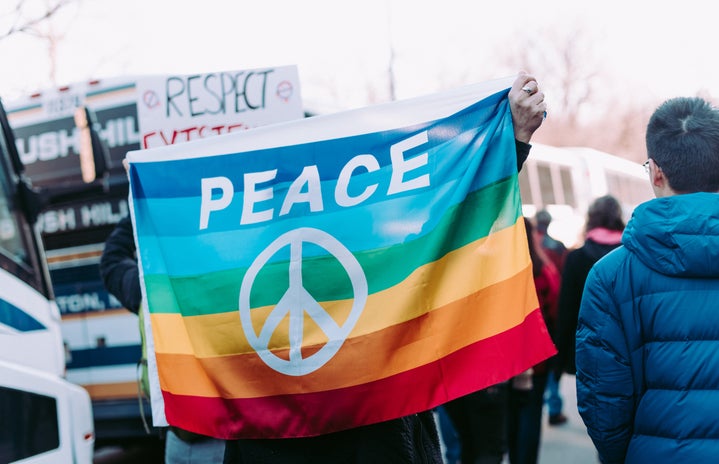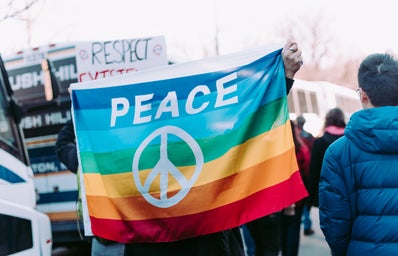Anti-Vietnam war demonstrations taking place during the Democratic National Convention in 1968 in Chicago turned into violent clashes with the police trying to disperse the protesters. After the protests, seven defendants- Abbie Hoffman, Jerry Rubin, David Dellinger, Tom Hayden, Rennie Davis, John Froines, and Lee Weiner- were charged by the United States federal government with conspiracy and intention to incite these riots. The trial of these 7 defendants transpired to be a loud affair and the 7 defendants were very often portrayed in movies, theatre plays and pieces of art. One such a movie is the 2020 ‘The Trial of the Chicago 7’, directed by Aaron Sorkin.
The movies’ plot, the actors’ play, and the topics covered throughout this film made it very compelling, moving and still relevant nowadays.
The film depicts dramatic and violent scenes of police attacking peaceful protesters with billy clubs, tear gas and using other violent means to disperse them. The scenes shot for the movie are intertwined with the historical videos, deepening the reality of the scene and constantly reminding the viewer about the authenticity of these events. When watching these scenes, you feel as if you were in that crowd, shouting and at the verge of the endurance of the tension between the protesters and the police. The scenes feel very real not only due to the editing, but also because they resonate with all of the contemporary protests that we can watch and experience on our own: the 2020 Black Life Matters protests all over the world, the 2020 anti-abortion ban protests in Poland, the 2020 protests in Belarus, as well as the on-going 2021 Russian protests. It clearly emphasizes the relevance of these past events with the present, showing how little changes in terms of how the government works- always using the police to brutally suppress the protesters if they are against something the government embraces; be it war, racism, women’s rights or the rule of law.
The anti-war and especially anti-Vietnam war protests were a threat to the current US policy. The government, busy with the Cold War, depicting the Communists as the “bad guys”, ironically wanted to silence any potential oppositionists within the country. Even though the law should safeguard the right to protest, it served as yet another means to suppress those considered a threat to the government- a practice so often deployed by totalitarian regimes the US was opposed to. The Chicago 7 were charged with conspiracy and crossing the states with the intention to incite riots as well as other charges, all related to the protests in Chicago in 1968. The democratic and allegedly free court was to decide about the fate of the defendants, yet it was perfectly clear that the Judge was hostile towards the 7 activists since day one. Therefore, even though on the surface the process was supposed to seem like a regular criminal process, it was actually just a means of the US government to incarcerate those opposing the establishment and the US involvement in the Vietnam war.
Yet the movie does not exactly depict the trial accurately. The very much Hollywood-like structure makes you sympathise with the defendants. This however seems very inaccurate given the context of the protests in the 1960s. The defendants were hippies, anti-war protesters and counter culturalists, a group that was certainly not very much sympathized with in the past and would not be very much liked nowadays. In fact, most Americans favoured and supported the US involvement in Vietnam war [1]. It is crucial to mention that Vietnam was also important for the US administration within the whole course of the Cold War. To lose or even retreat from Vietnam seemed unthinkable, as that would be viewed as a loss with Communism. Therefore, to picture the defendants as ‘heroes’ and very likeable characters does not reflect the reality of the US in the 1960s. They were rather extreme outcasts, disliked by both society and the government.
Moreover, the movie does not fully reflect the actual views or even behaviours of the defendants. All are portrayed as good people fighting for democracy. That is not entirely accurate, as Abbie Hoffman, even though the leader of the Flower Power peaceful movement [2], might not be regarded as a peaceful person in general terms. On the day of his testimony, he wrote “FUCK” on his head to avoid being published in the newspaper and to express his attitude towards the whole situation[3]. On another occasion during the trial, Abbie Hoffman and Jerry Rubin wore judicial robes to court to later step on them. What is more, all of the defendants very often insulted the Judge, using slurs such as “pig” or “fascist” and even comparing him to Adolf Hitler[4]. All these facts were not mentioned nor shown in the movie, clearly portraying the defendants as the “good guys” and the Judge as the “bad guy”. This clear-cut division is a very fairy-tale-like and Hollywood-like approach to the concepts of ‘goodness’ and ‘badness’, which makes the defendants likeable in the movie; even though in reality they would most likely not be liked at all.
The movie evokes a lot of emotions, discussions and questions. As most of the viewers, I sympathised with the Chicago 7, yet I was also aware of certain simplifications in the movie, such as the portrayal of Abbie Hoffman and Jerry Rubin and the clear-cut division between the “good” and the “bad”. Yet things such as depicting the problem of police brutality, as well as showing the questionable status of US democracy, are not the only things that make this movie remarkable and compelling. The actors’ play allows you to experience the emotions and attitudes presented in the movie, hence making it worth watching.
Sources:
[1] Lunch, William L., and Peter W. Sperlich. “American Public Opinion and the War in Vietnam.” The Western Political Quarterly 32, no. 1 (1979): 21-44. Accessed January 24, 2021. doi:10.2307/447561.
[2] Hoffman, Abbie (2009). Revolution for the Hell of It: The Book That Earned Abbie Hoffman a Five-Year Prison Term at the Chicago Conspiracy Trial. Da Capo Press. p. 114
[3] Linder, Douglas O. “Testimony of Abbie Hoffman”. Famous Trials. UMKC School of Law. Accessed 24 January 2021.
[4] “Judge Julius Hoffman Dies”. The Washington Post. July 2, 1983.



